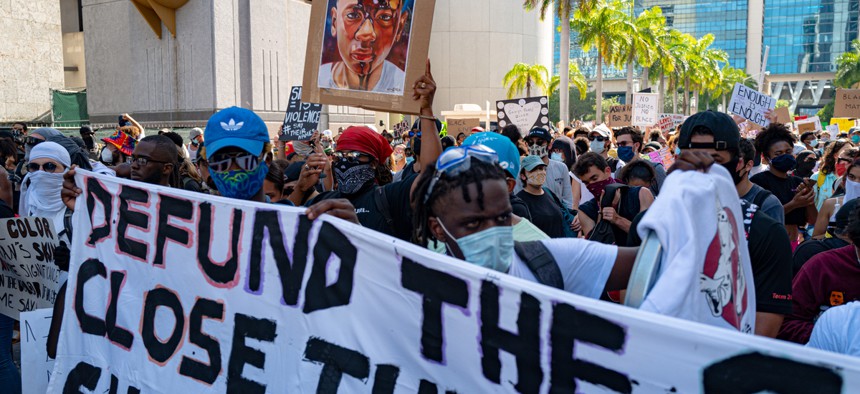Protesters Demand Defunding and Demilitarization of Police

A sign in Miami calls for the police to be defunded. Shutterstock

Connecting state and local government leaders
In cities across the country, protest organizers say they want less money from local government budgets going to the police.
At protests across the country this weekend, demonstrators called for justice in the case of George Floyd, a black Minneapolis man who died after a white police officer knelt on his neck for almost nine minutes.
While many of the demands were specific to the incident, such as the wish for all four police officers at the scene to be charged, other protesters say they are focused on broader issues: police budgets, policies, and oversight.
In Minneapolis, protesters say they want the mayor and city council to closely evaluate the money spent on the city’s police force. Kandace Montgomery, an organizer for the protests in the city, said in an interview this weekend with Truthout that she wants to see the city invest in “community-led safety solutions” instead.
“We want justice for George Floyd, and we think accountability with the officers is really necessary. And too often we just lean on that accountability and feed more into a prison system that continues to be harmful to all of our communities,” she said. “And so now is really the time for the Minneapolis City Council and mayor to defund the police and invest in community.”
Protesters from New York to Los Angeles echoed those calls, demanding that city leaders restructure budgets and defund local police departments. In some places, city leaders responded that they want to hear these concerns.
In Washington, D.C., Councilmember Charles Allen, the chair of the committee on the judiciary and public safety, decided to reschedule a police budget oversight hearing originally scheduled for Monday “due to the importance of the protests around the murder of George Floyd.” The hearing was supposed to be 90 minutes, but Allen said he will “find an additional time for District residents to testify.”
“Thousands of District residents are calling out injustice, racism, and police brutality against Black Americans,” he said in a statement. “It is clear to me the public needs more opportunities to testify directly before the Council on the issues of policing communities of color, excessive force, freedom of speech, and public funding for law enforcement agencies and violence prevention. Our budget is a document that reflects our values, including around law enforcement and how to improve public safety.”
As cities engage in a debate over how to invest public safety dollars, protesters are urging officials to look at existing models of community-led efforts. Many cities have violence interruption programs that rely on people trained in conflict resolution to preemptively approach those who might get involved in crime and offer them support like food, housing, and employment opportunities. In other places, like Dallas, emergency responders are sending social workers (instead of police) to 911 calls where mental health emergencies might require the use of deescalation strategies.
Besides budgetary concerns, another common chant among protesters this weekend was one calling for the demilitarization of the police as officers at the protests across the country donned riot gear, deployed tear gas and rubber bullets, and referred to demonstration crowd control as “urban warfare.”
The militarization of the police, according to the center-right R Street Institute, has been driven for decades by “the largely unsupported belief that American streets constitute a war zone and supplied by a steady stream of cast-off military equipment from the Pentagon” that have given local police forces a “police-against-the-world mentality.” President Obama limited the ability of local departments to access surplus military gear like grenade launchers and armored vehicles in 2015. This decision followed a nationwide debate over the use of force to quell protests after the police shooting of Michael Brown in Ferguson, Missouri. But in 2017, President Trump’s first attorney general, Jeff Sessions, reinstated the program, saying the supplies constituted “lifesaving gear.”
Police unions have been largely resistant to calls for demilitarization in the past, saying the equipment is necessary for their work. In a letter sent Monday to members of the Minneapolis police union by the group’s president, Bob Kroll, he argued that protests only got out of hand because the police were understaffed and were told to wait before using tear gas and rubber bullets. “This terrorist movement that is currently occurring was a long time build up,” he wrote. “Starting with minimizing the size of our police force and diverting funds to community activists with an anti-police agenda … Given the right numbers, the right equipment, and your ability to use [the equipment, this] would have ended this Tuesday night.”
Some protesters and aid organizations counter that a forceful response to demonstrations against police violence only fan the flames of a volatile situation. Amnesty International released a statement on Sunday calling for police to put down their weapons. "In city after city, we are witnessing actions that could be considered unnecessary or excessive force,” the group said. "U.S. police across the country are failing their obligations under international law to respect and facilitate the right to peaceful protest, exacerbating a tense situation and endangering the lives of protesters. Police must engage in de-escalation, before the situation worsens.”
Emma Coleman is the assistant editor for Route Fifty.

NEXT STORY: Protests Could Lead to Surge of Coronavirus Cases, Officials Say





